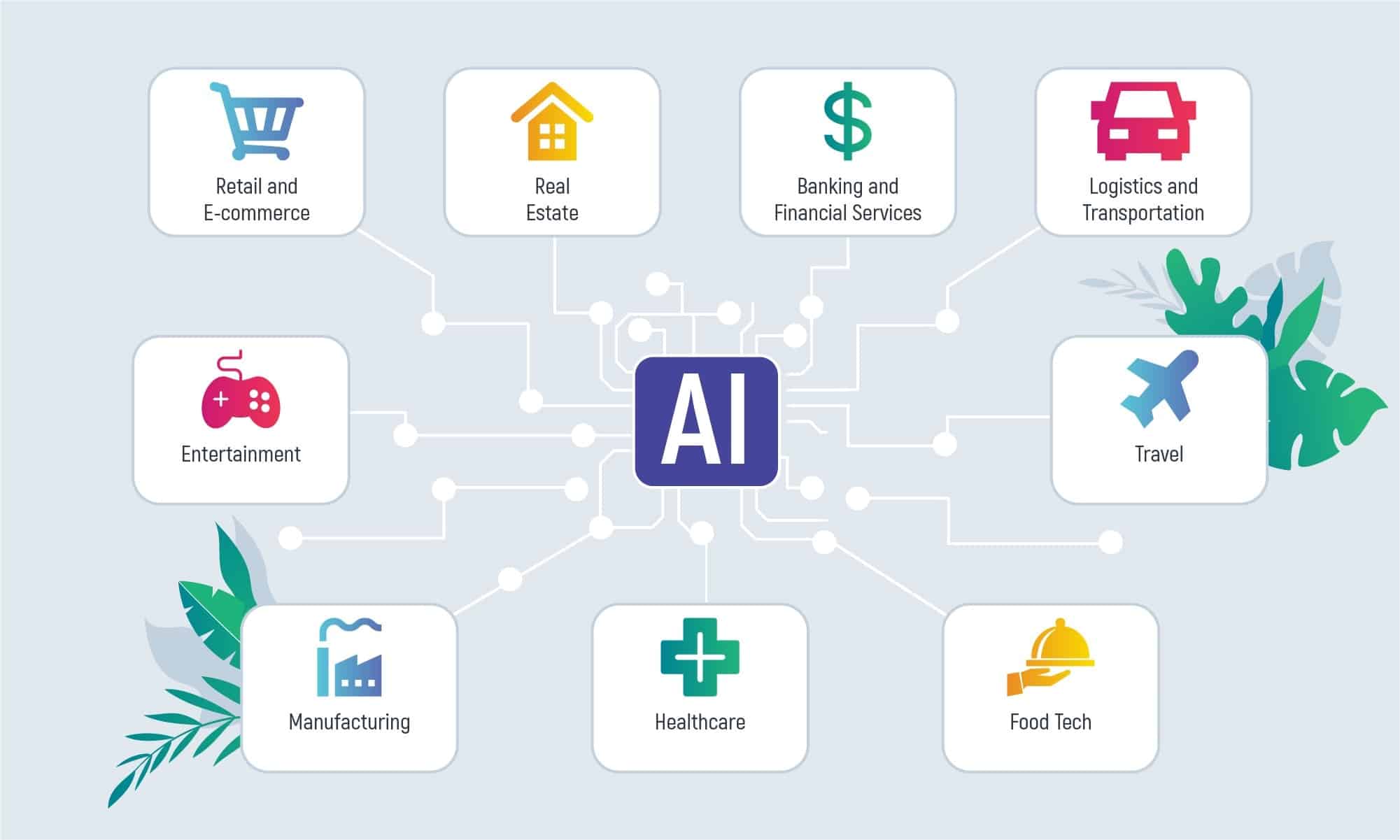Navigating the intricacies of Artificial Intelligence (AI) in the Real Estate sector is crucial for modern business success. Explore the market trends, the role of AI in Real Estate, and discover practical applications. Uncover the benefits, potential challenges, and understand how Inoxoft's expertise can propel your Real Estate business into the future.
What You Will Learn:
- AI's pivotal role in revolutionizing Real Estate alongside its market penetration.
- How AI automation reshapes traditional roles, with a focus on Real Estate agents and industry representatives.
- Extensive applications of AI in Real Estate, from automated valuation models to customer relationship management.
- The tangible benefits of AI technology, including error reduction, advanced analytics, streamlined transactions, and 24/7 operational efficiency.
- Potential challenges AI poses in Real Estate, such as job displacement and cost considerations.
Equip yourself with strategic insights, stay ahead in the evolving Real Estate landscape, and leverage AI to elevate your business operations.
- The Role of AI in Real Estate
- How is Artificial Intelligence Used in the Real Estate Business?
- Automated valuation models
- Smart property analysis
- Aid in property development
- Mortgage calculation
- Property recommendation
- Customer relationship management (CRM)
- Chatbots
- Automation of Manual Tasks
- Management Software Solutions
- What Benefits Can You Get from Using AI Technology for Real Estate Business?
- + Error reduction
- + Great analytics
- + Easy transactions
- + 24/7 operations
- What May be the Challenges of AI in Real Estate?
- - People can lose jobs
- - The cost of AI is too high
- - Algorithms cannot be creative
- Summing Up
- Consider Inoxoft Team to Modernize Your Real Estate Business
Artificial Intelligence (AI) has been the top business automation technology for several years now. Perhaps, the intensity of its growth started in 2018. Since then, AI has changed every industry for the better. Which industries exactly? Let’s see:
The most recent data available estimates the value of the global AI market to be around $196.63 billion in 2024. This amount is higher than the $142.32 billion from 2022. The market is anticipated to expand between 2023 and 2030 at a compound annual growth rate (CAGR) of 21.6% to 37.3%, reaching USD 2,025.12 billion to USD 2,847.50 billion by 2030.
What is Artificial technology about if it is that popular now? Mainly, it encompasses the trained algorithms that gather user data. This is done to be able to learn from the data obtained. And make better offers for customers in future. Sounds super convenient!
As our topic includes the Real Estate industry, the main question here is what are the examples of artificial intelligence in Real Estate? Its use and benefits in the chosen sector. Let’s find out!
The Role of AI in Real Estate
Various sources estimate that the size of the global real estate market in 2023 was between USD 3.88 trillion and USD 7,239 billion. Statista predicts its major increase at a CAGR of 4.8% up to 2030. So, by 2030, the size of the Real Estate market is going to be at least $14.6 billion if not more.
What factors would impact the market’s development to such an extent? Probably:
- the saturation of the residential Real Estate market
- if governments will increase spending on infrastructure development
And, also, with such technology as AI in the Real Estate industry, the market will not stay still. It is reported that 9 out of 10 businesses invest in AI technologies. Gartner surveyed companies and it turned out that 37% of them used AI daily. The thing is, Artificial Intelligence brings automation to a business. And, it can automate solutions for Real Estate. Here, most of the manual work becomes unneeded. Thus, employees carrying out this work are left behind. The World Economic Forum believes that by 2025 AI will be responsible for 85 million jobs that will stop existing and 97 million ones that will be created.
Would it also touch Real Estate agents? We don’t think so. Perhaps, AI smart solutions will enhance the work of company agents, brokers, and other Real Estate representatives. The Artificial Intelligence approach allows learning from the data that is there. It cannot substitute a person, who meets with people, gives documents to sign, and interacts all the time in case of need. So, the role of AI in Real Estate is to enhance and advance the industry.
How is Artificial Intelligence Used in the Real Estate Business?
The use of Artificial Intelligence in Real Estate is extensive. There are many ways AI can automate processes these days. The most crucial of them are:
Automated valuation models
The models are designed specifically to predict market values taking into account lots of factors. Of course, the algorithms do the work. What data do they use? Mainly, a combination of all the possible data sources to make the AI in Real Estate valuation of:
- historical data
- age of a home
- images of a house
- market value
- market trends
- neighborhood
This type of evaluation can be also made by a Real Estate agent. But, AI can be several times more accurate.
Smart property analysis
This task is usually done by a Real Estate agent. And, still, the work will be considered objective. But, if you substitute this manual task with an AI for Real Estate agents, the work will be done faster, in a more accurate way, etc. For instance, AI can show you
- a detailed annual sunlight amount
- the time of best light during the day
- any sound disturbance
- parking space availability
- plowing
AI can extract information that even agents will not be able to obtain or observe.
Aid in property development
Do you need to analyze a specific area to build something there? That would be a great chance for AI in Real Estate investment. If you input accurate datasets, AI-powered apps can suggest places for the building based on:
- city zoning
- trends in the industry
- currently available locations
- future local infrastructure
Mortgage calculation
Calculating a mortgage is rather a complex task. But, with AI in the Real Estate business agents can do it faster and easier. Algorithms are smart enough to find errors while screening mortgages. And even more, with AI you can:
- calculate income
- analyze key documents
- check income sources
Property recommendation
Insert customer preferences such as location, price, number of rooms, etc., and receive a property recommendation from algorithms that learn on their own. These can be on MLS websites or built into a CRM system. With their help any customer can be approached individually, providing customized suggestions and recommendations. The power of AI is really exciting!
Customer relationship management (CRM)
A CRM system is a perfect solution to help agents form long-lasting relationships with their clients. If a Real Estate buyer made one purchase, this shouldn’t be taken as an end of the relationship. A CRM system will include basic customer info and suggestions to aid during moving houses, renting apartments or offices, selling property, or buying another one.
Chatbots
Benefits of AI for Real Estate also include the possibility to have a website chatbot. Why do you need a chatbot in Real Estate? For instance, to:
- relieve agents of the questions consumers tend to ask
- collect leads
- give virtual home tours
In a nutshell, chatbots greatly help Real Estate agents as they take on a significant part of their job. And carry out it perfectly fine 24/7.
Automation of Manual Tasks
The Real Estate industry is full of transactions. Documents are being sent here and there as well as new ones are created. I.e. different reports, legal papers, zoning regulations, requests for proposals, various analyses, agreements, etc. The advantages of AI for Real Estate include tools that review these documents and scan them for mistakes. Some AI apps are even designed to create flawless documents automatically.
Management Software Solutions
Among the other uses, one can notice Multiple Listings Services, HOA Management Software, and IDX Software that in one way or the other require the use of AI technology in Real Estate.
And we provide services for all of these Real Estate solutions. Get to see what we can do by clicking the links above.
What Benefits Can You Get from Using AI Technology for Real Estate Business?
The use of AI in Real Estate has proven to be a positive thing. With the automation of business processes and better market analysis it became possible to define the following pros of AI technology in Real Estate:
+ Error reduction
Humans have always been prone to error. But, smart algorithms have no such thing as an error. They cannot exhaust themselves or overlook details like humans. So, with the right AI model training, you can get almost any information you want concerning Real Estate.
+ Great analytics
To produce a construction project or show potential clients some homes a lot of research is required. To present your stakeholders with solid research, you need to conduct it first. And, not every piece of information can be disclosed easily and quickly. But, that is not the case with AI in Real Estate. With the help of smart algorithms, it is possible to figure out the best location to build houses, what your key users are searching for, and provide better recommendation services. Agents will only benefit from the analytics here. What’s more:
- AI automates a lot of manual work
- AI designs better security and fire safety systems
- AI predicts the property market value
- AI creates buildings 100% more appealing to buyers
+ Easy transactions
AI spots errors in any type of Real Estate documentation. And, agents work with these documents daily. That’s why it is important to use AI here. The results are more accurate and more key consumers may be involved. Besides, the Real Estate industry has lots of data to deal with every day. So, AI can make the process safer and better to the maximum extent.
+ 24/7 operations
Unlike humans, AI can work every time: during days and nights without a need to stop. And, that’s its main benefit. You cannot insist on the Real Estate agent’s help out of his/her working hours. But you can turn to AI. Give algorithms a task and they will perform it and learn from the data they obtain. That’s how you can save money and time and please your potential consumers.
What May be the Challenges of AI in Real Estate?
The benefits of AI for the Real Estate industry are pretty clear. But, have you wondered whether AI can have a negative impact on Real Estate? What if there is nothing good about AI technologies for Real Estate? For instance,
– People can lose jobs
If AI automates everything, what will happen to people, who carry out manual work? They can lose their jobs and struggle to find new ones. However, experts say, that is fully impossible. AI is a helpful tool for Real Estate agents and sector representatives. Unless your company finds a way to make AI work for you not against you, there will be a slight chance that the automatization of work might cause global unemployment. But, so far, AI did not cause any negative impact. It only boosts the industry and its processes. And, becomes a great partner in analyzing user data as well as searching for particular homes to sell, rent, buy, etc.
– The cost of AI is too high
Being a new and popular technology on the market makes AI quite costly. And, not only the software but the hardware for its running and maintenance as well. Also, AI requires a great storage solution as it needs space to focus on analysis. So, you might find it expensive, especially if you’re a startup. But, don’t worry. Inoxofts has an app development calculator for that matter. And our experts can consult you on the costs you invest and the costs you get in return. Don’t make hasty decisions – always ask a professional for a second thought!
– Algorithms cannot be creative
By implementing AI technology for Real Estate you can always be sure, that your automated system will work with lots of data and extract valuable insights. But, it will never give out results as to how to design the buildings. It just can’t. To ensure this factor, AI has to be trained and monitored by a human. And, still, AI won’t work alone and cannot design a building. So, designers have a chance to prosper in the industry. And, they never have to fear AI will substitute for them. At this point, such a technological breakthrough isn’t going to happen. Designers will still have their jobs in Real Estate.
Summing Up
-
AI Revolutionizing Industries: The adoption of artificial intelligence (AI) has led to transformative changes across various industries, including banking, healthcare, manufacturing, and retail. AI technologies have revolutionized traditional business processes, driving efficiency, productivity, and innovation.
-
Global Market Trends: The global AI market has experienced exponential growth, with the market size about $196.63 billion in 2024. Forecasts predict continued expansion, reaching USD 2,847.50 billion by 2030. This growth underscores the widespread adoption and increasing importance of AI across sectors worldwide.
-
AI in Real Estate: The Real Estate industry has embraced AI technologies to enhance operations and deliver value to stakeholders. With global Real Estate revenue reaching approximately USD 7,239 billion in 2023 and projected growth, AI solutions play a pivotal role in driving efficiency and competitiveness in the sector.
-
Factors Driving Market Development: Several factors contribute to the growth of the Real Estate market, including infrastructure development, government spending, and technological advancements such as AI. The integration of AI technologies enables Real Estate businesses to streamline processes, improve decision-making, and enhance customer experiences.
-
Role of AI in Automation: AI brings automation to the Real Estate industry, enabling businesses to automate manual tasks, streamline operations, and improve overall efficiency. While AI may impact job roles, its primary role is to enhance the work of Real Estate agents and professionals rather than replace them entirely.
-
Applications of AI in Real Estate: AI applications in Real Estate encompass various functions, including automated valuation models, smart property analysis, property development analysis, mortgage calculation, property recommendation systems, CRM systems, chatbots, document automation, and management software solutions.
-
Benefits of AI in Real Estate: The adoption of AI technology in Real Estate offers numerous benefits, including error reduction, enhanced analytics capabilities, streamlined transactions, and 24/7 operational efficiency. AI-driven solutions enable Real Estate businesses to deliver superior services, improve decision-making, and gain a competitive edge in the market.
-
Challenges of AI in Real Estate: Despite its benefits, AI adoption in Real Estate presents challenges such as potential job displacement, high implementation costs, and limitations in creativity. However, these challenges can be mitigated through strategic planning, investment in training and development, and collaboration between AI technologies and human expertise.
-
Inoxoft as a Trusted Partner: Inoxoft offers custom Real Estate development services and expertise in AI and machine learning (ML) development. With a focus on industry trends and cutting-edge technologies, Inoxoft helps Real Estate businesses modernize their operations, automate processes, and enhance customer experiences through AI-driven solutions.
-
Future Outlook: The integration of AI technologies in the Real Estate industry is poised to continue, driving innovation, efficiency, and growth. As AI becomes increasingly sophisticated and accessible, it will play an integral role in shaping the future of Real Estate, offering new opportunities for businesses to thrive in a rapidly evolving market landscape.
Consider Inoxoft Team to Modernize Your Real Estate Business
Inoxoft is popular among clients for its custom Real Estate development services. That’s because we are monitoring the Real Estate market all the time and learning all the newest tendencies. Our team also provides excellent AI and ML development services. And, which is pretty clear, we are used to offering great AI for Real Estate companies with RETS standards for the Real Estate project.
Today, having AI applications in Real Estate allows not only to build a high-profitable business but to earn consumer trust. AI software for Real Estate makes every manual process automated, advanced, faster, and more flexible. Users admire the MLS, HOA, IDX, and Property management software. All of them use AI for Real Estate in one way or the other. If you want to know what these types of management software are visit our industry-based services. Do contact us to receive a valuable consultation. Ask our experts all the questions you have and get all the needed answers. Have a look at one of our case studies in the industry below.
We work to make your business grow. We build innovative solutions to make the world a better place!
Frequently Asked Questions
How is AI technology used in Real Estate?
It is used to automate processes, analyse data, give recommendations, manage properties, calculate mortgage, and etc.
What is AI in Real Estate development?
AI is a technology that uses the trained smart algorithms to analyse valuable user data and learn from it. Based on the learned data, AI can give out recommendations and offer property selections, etc.
What are the pros of AI technology for Real Estate?
It can reduce errors, provide analytics, help with transactions and function 24/7












